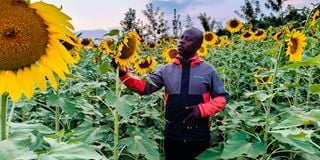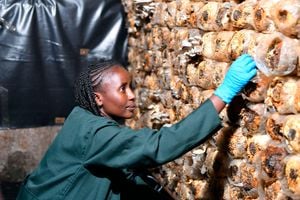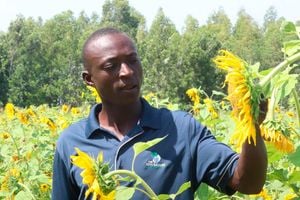
Tom Arody inspects sunflowers at his farm in Bondo, Siaya County.
In the rolling hills of Abom, Bondo, Tom Arody, a 44-year-old director at an international NGO, has found a peaceful escape from the hectic pace of life in Nairobi.
Arody, who purchased nearly two acres of land in 2020, has built a sanctuary where he can pursue his passion for farming while also creating a family home.
The property, although just under two acres, allows Arody to focus his farming efforts on approximately 1.3 acres. He uses the remaining space to grow additional crops for domestic use, such as cassava, bananas, and vegetables.
Over the past few years, he has experimented with a wide range of crops, from rose coco beans to maize, groundnuts, watermelons, yellow beans, and various vegetables like cabbages and spinach.
In 2024, Arody took on a new challenge - sunflower farming. His interest in sunflowers was sparked by a Facebook friend who, after seeing his agricultural posts, recommended the crop, citing a government initiative promoting sunflower farming in Eastern Kenya.
Arody, who had never seen a sunflower in person before, was intrigued by the rapid growth of the crop and its minimal maintenance requirements.
“I’ve never regretted it,” Arody says of his sunflower farming venture.
He planted his first crop in late February 2024 and was impressed when he harvested 130 litres of oil just 90 days later. The following harvest, in September, also yielded strong results, further solidifying his enthusiasm for sunflowers.
Arody now sells his sunflower oil under the brand name Abom Sunflower Oil.
His primary sales avenue is his social media network, where he shares his farming journey.
“I often face high demand at harvest time, and I sell out within three days,” he explains.
Although he does sell his oil online, Arody also sets aside some for local women who assist him with farm work. He encourages them to consider planting sunflowers on their own farms, helping to spread the knowledge of the crop and its benefits.
Arody’s farming journey began in earnest five years ago, when his NGO role allowed him to work remotely. The peacefulness of Abom, in stark contrast to his busy professional life, quickly became a source of relief.
What started as a hobby has evolved into a serious farming venture. With a background in agriculture up to the form-four level, Arody was able to apply his foundational knowledge to good use.

Tom Arody inspects sunflowers at his farm in Bondo, Siaya County.
His first successful crop, rosecoco beans, generated 10 bags, which were sold to a local secondary school and used to help build the family home in the village.
Encouraged by this early success, Arody expanded his farming efforts. Maize followed, yielding 27 bags that he sold to a nearby academy, and later, he harvested 14 tonnes of watermelons, which were purchased by a reseller from Kisumu.
Arody’s next venture was groundnuts, but the labour-intensive nature of processing them made it difficult to profit. He eventually handed the harvest to his mother, who managed to shell and sell the nuts.
Over time, Arody has continued to diversify his farm. He grows yellow beans, as well as a variety of both traditional indigenous and exotic vegetables, including collard greens, cabbages, and spinach.
“My farm is active year-round, thanks to crop rotation,” he explains, reflecting his commitment to exploring new agricultural practices.
Despite his success, farming has not been without its challenges. Arody recalls the damage caused by pests, particularly the fall armyworm that attacks maize and aphids that affect beans. There was also a particularly devastating attack by monkeys that left him with only six cobs of maize from an entire acre.
In addition to these pests, Arody has faced difficulties with sunflower farming, particularly the lack of government support for processing sunflower seeds locally.
While sunflower oil is a promising revenue stream, Arody must rely on costly private pressing equipment, which sometimes fails, resulting in lost oil.
“If I had access to animal feed processing equipment, I could also make use of my sunflower seedcake,” he says, noting that he is eager to maximize every part of his crops.
In his efforts to address weather challenges, Arody monitors weather forecasts through the Kenya Meteorological Department’s WhatsApp updates and the Kenya Agricultural Observatory Platform.
“I spend weekends at the farm, ensuring I stay connected to my crops,” he says, emphasising his dedication to the land.
Looking ahead, Arody has big plans for his farm. He dreams of incorporating greenhouses, drilling a borehole to reduce his reliance on rainfed agriculture, and expanding into goat rearing and dairy cows by 2025.
He believes agriculture will continue to be a vital source of income for many, especially young people, and he encourages them to get involved.
“The sooner you start, the better,” he advises.









